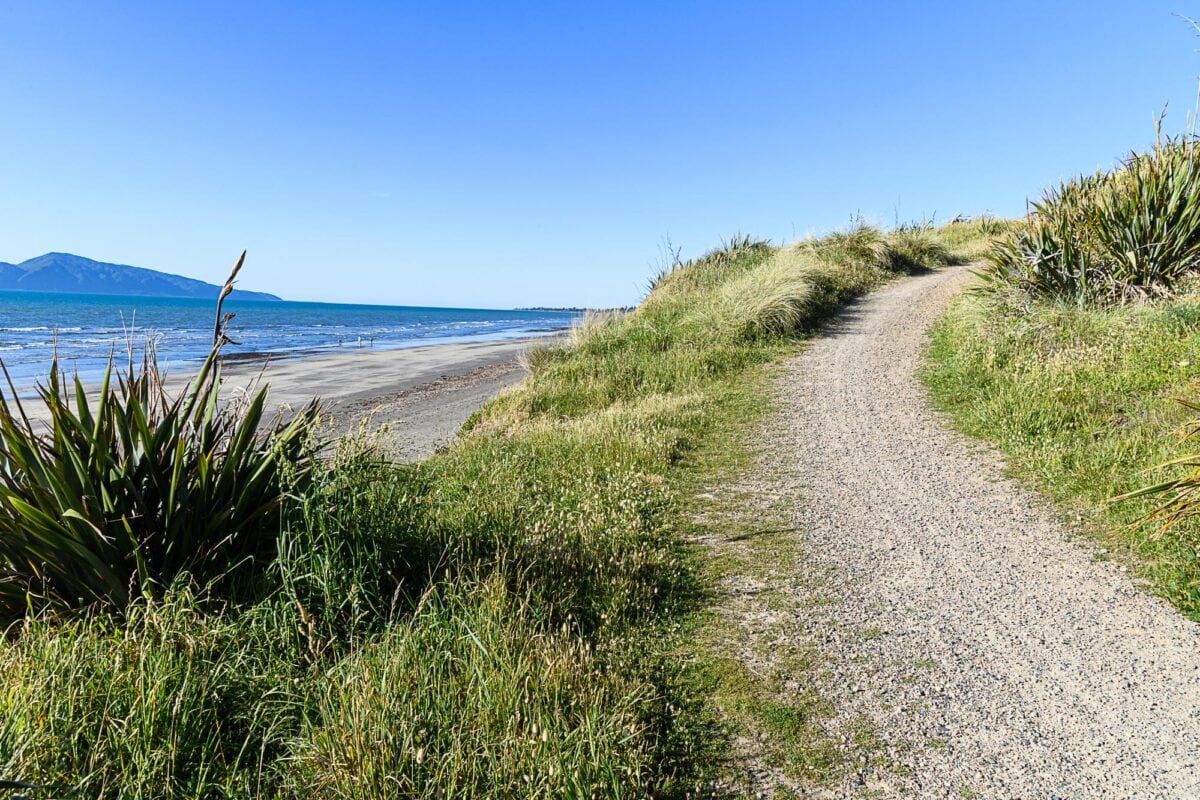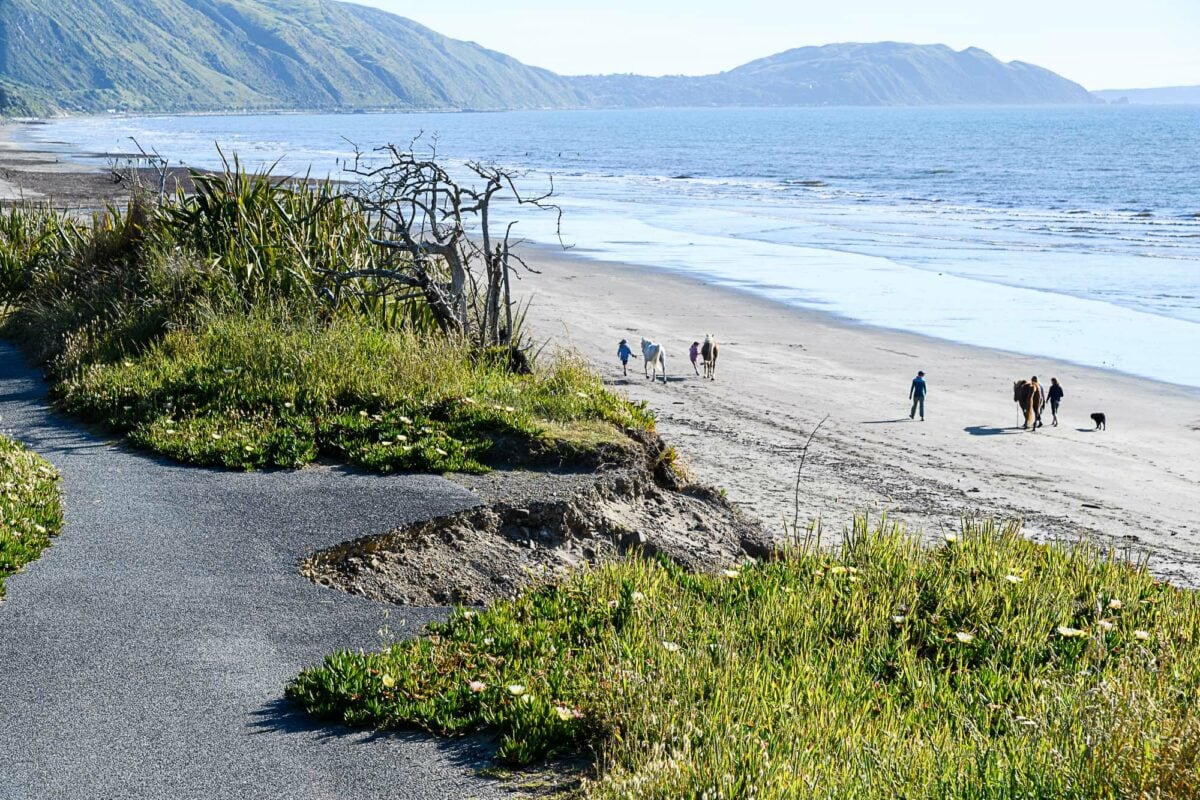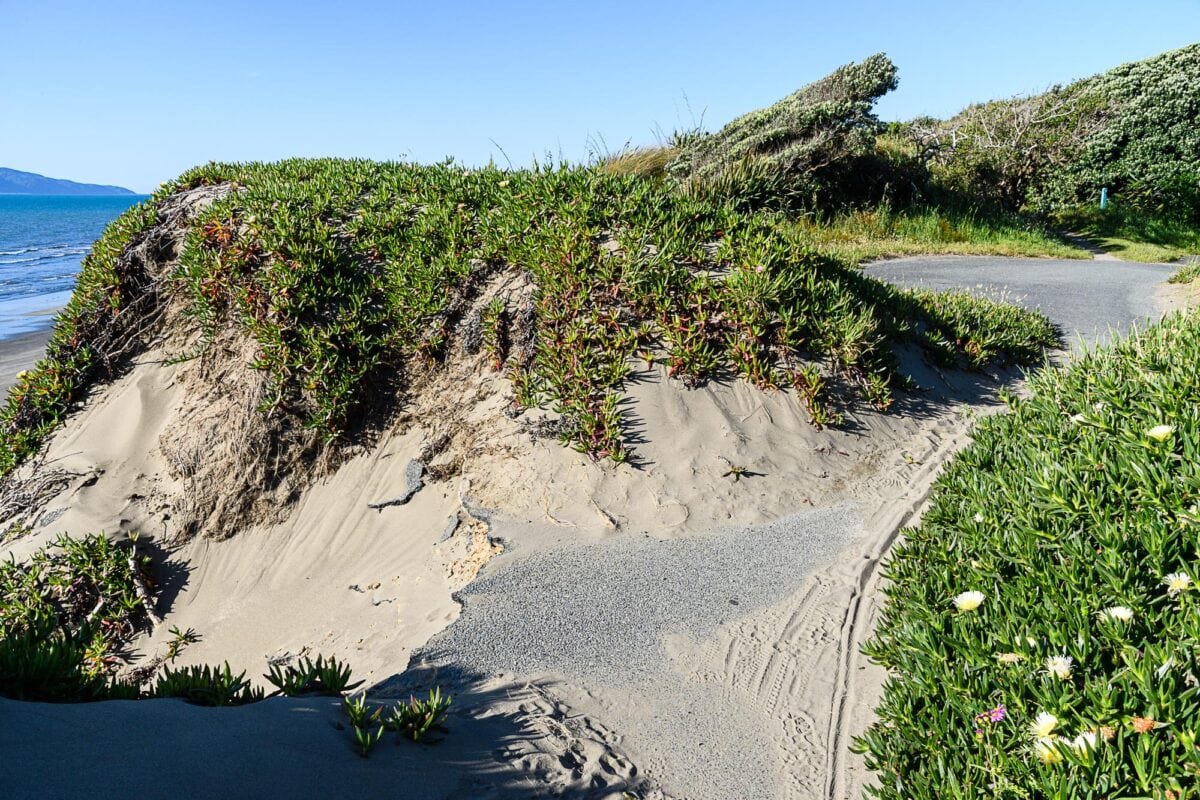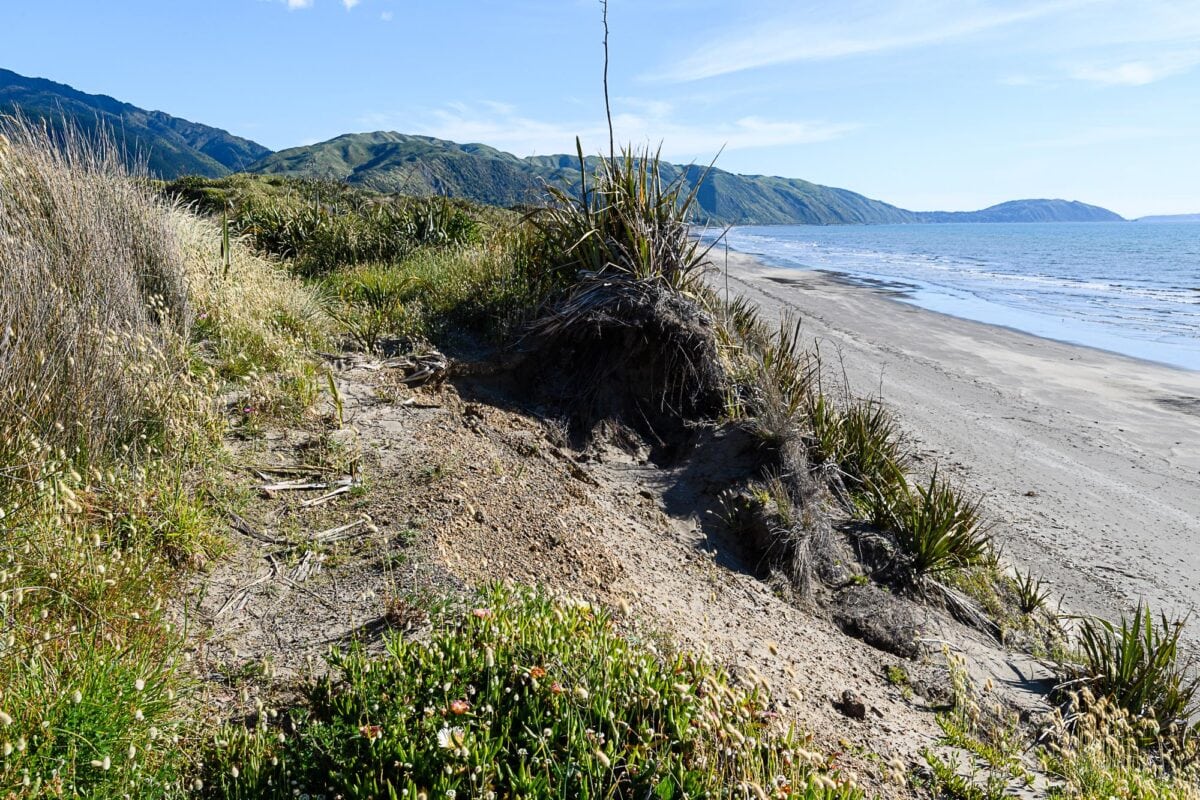Paekākāriki.nz proudly presents the third in its commissioned series of creative writing to go with our walks. In an allegorical and thought-provoking story, Apirana Taylor winds his way along the Coastal Track through Queen Elizabeth Park between Wainui and Whareroa pā sites. This series sees our writers paid through funding provided by the Kāpiti Coast District Council Creative Communities scheme. The first story, ‘Tūrangawaewae’ by Dani Deluka is here, and and second, ‘The Ballad of the Triple Track’ by Michael O’Leary can be read here.

On a fine blue sky, sea blue morning after the early springs sun dawning, my love and I set out to walk the Whareroa walkway. A perfect day for such a journey, I thought, until I remembered long ago, Te Rauparaha drenched the sea red with blood and fought bloody battles on this shore. Ghosts from days of old dance their haka and call, I’m told, of war and how this child of Tumatauenga, the war god, piled the bodies of his enemies up, on this coastline, like a macabre necklace strung around the throat of the sea.
On this morning no such violent storms assailed us. The mellifluous whistles waiata and song of the tui punctuated and accented by syncopated series of rhythmic clicks danced and swooped in acrobatic, hi-fi stereophonic opera about our ears.
The weather here however, can change its moods, from sunshine paradise to howling raging storm in less time than it takes to say walkway. That too, has its wild beauty, when the raging tempest lashes the shore.
Ah, but the day’s karanga beckons me to live in this moment, therefore I decide to listen to the call as long as I can and drink the day like the nectar of the gods or to be more relevant, the nectar of the tui feasting on the flax pods and pohutukawa blossoms. I hope to find a poem on this walkway. Lines within that will close the day in a sunset and jewels of light dancing on the sea.
We walked the trail through the early snap and crackle of flax pods and the waiata of bird song which is to me, the korero of Atua, in harmony with the sibilant sound of little waves rippling their way up the beach, sifting the sand. These could be the sands of time.
We seldom speak on our walk because we are two souls, two wairua, as one on our journey and don’t have to converse or fuse in constant chatter. We can amble along the track and be closer and understand each other perfectly well through the morning serenade of waiata, songs and melodies. Each lost in our own separate worlds.
The gulls squabble, squawk and bluster, screech and burp loud expostulations. They are said to be the rats of the sky. They are proddy, pokey, greedy`, aggressive and unkind to each other. They are masters of the skies, wind riders of the sea. They have their place.
A gentle breeze entwines and threads itself in the flax leaves with a rustle and what does the wind say? It whispers. Listen … listen.
murmuring breeze
murmuring breeze
rustling bustling
with the fluttering
leaves
Pohutukawa trees display the first hint of flowering. A promise of early summer just over the rise. A repeat season, perhaps, of golden halcyon days. This pledge is not always fulfilled. A few months hence and the blossoms will fall and spread their slender threads like a stain in the red carpets weave on the autumnal trail. Blood beneath our feet.
A walk is a good time for my senses to flower open. As I look out on the world and into myself I sense and feel the tides that come and go. I see the island, Kāpiti. She looks like a woman reclining on her side sleeping on the bed of Tangaroa and beyond, the strait on the silver thin pencil-line horizon is Farewell Spit.
We say a friendly, ‘Kia ora,’ and smile to passing strangers on the walkway. We warm to and greet friends. ‘Kia ora.’
‘Kia ora,’ they reply. The words sound like tui talk. ‘Kia ora. Kia ora.’

On the roadside and in the brackeny ferns poking up through the earth hundreds of little piko piko fronds awaken, stretch and koru their way up to the light. ‘Piko piko, piko piko what do you see?’
‘Oh I see the sun as I rise in the morning and I see greens, browns and golden colours all around me.’
The trees, rocks, birds, grains of sand and sea shells are tribes of people. They talk and sing if we listen. I often feel little need for human company or conversation. Sometimes I think this world’s a mad opera and symphony, a misunderstood play, written and composed by an artist who is beyond us. We are actors who have forgotten our lines. Tone deaf musicians. I pick up a shell and put it to my ear and what do I hear? The lost soul of the seashell whispers, intones and chants, ‘We are not dead. We have just moved on. We sing of the sea. In life I was a Pipi.’
Sometimes I wonder why we must all be roped in and tethered to the network of walkways and bicycle lanes that connect Aotearoa up to the mains. We pollute wherever we go. Why can’t we leave the wild bush lands, swamps, rivers seas, lakes, streams, flora and fauna alone? Let nature be. Leave Papatuanuku to heal and re-clothe as we work to nurture, to revitalise and replant the planet for our children.
Plastic rides the waves. We pollute wherever we go. This is how the world could end, neither with a bang nor a whimper but choked to death under a pile of plastic and rubbish. Parts of the walkway have slipped away where the dunes need planting out with tussock and grasses such as pingao to help resist the biting wind and marauding sea. I wonder if rising water levels will wash this coast line away altogether and will waves wash over our mighty cities. ‘Haere atu ra. Haere atu ra Papatuanuku. Haere atu ra Ranginui.’ Farewell Earthmother. Farewell Skyfather.

These thoughts cast cloud like shadows over the sky in my mind and I turn away returning to the sunny day before me, because this is not meant to be a dark poem but the darkness keeps edging itself in and threatens to black everything out. Sunbeams sing, ‘Enjoy the passing sunlight as we stroll along the rim of the abyss. Where there is light there is truth and joy.’
We pause a moment on our journey to pick wild flowers from the trail. The scent is heady and intoxicating. Flowers are one of the Atua’s great gifts. They speak to us. We send posies and bouquets to those we love, in celebration, to our bereaved or to the ailing. What do the wild flowers say?
I look over the palisades of flax and down to the sandy beach below the dunes. I sense another aroma, not sweet and heady like the flowers but a malodorous stench that wafts about in the air. It’s the reek of dead shrimpish krill-like creatures curled up like question marks on the shore. It’s the smell of death. Another gift of the Atua. For the sea has washed up its children and left them on the ocean’s dead water line for us to see and learn from. One day our earthly temples will be washed up on the shore and swept away in the tides. We are little boats hugging the coastline.
A song from childhood sings its way into the poem I seek.
‘Red sails in the sunset. Way out on the sea.
Please carry my loved one home safely to me.’
In the channel between the dune hugging walkway and Kāpiti, tribes of whales in days of old, passed by so multitudinous you could step across their backs from the beach below to the island, I am told.
I don’t go on power walks to stretch and exercise my body. I amble at a leisurely stroll to take the time, to take the time, to let my senses open. Paekākariki is the parrot’s perch. Raumati is summer. Whareroa is the long house.
This walkway is not the yellow brick road. There is no pot of gold at the end of the rainbow. But there is a pot of cool beer at the cafe in Raumati. Time to refresh. Then we return. Going south from summer to the parrot’s perch.

I can’t find the poem I seek on the walkway today. It’s like trying to pick up the sand, or the roil, the briny sea water in my hand. The water and sand slips through the net of my fingers leaving only threadbare strands of lines…
the tui karanga and birds chorus
the spears of feathered flax stalks
the driftwood are bones of taniwha tossed up by the sea
oyster catchers spear the sand and poke about in the sea’s matrix
the salty sea air
the water colour of the sea
words are flowers, nurture them, plant them and you will grow a colourful garden
haere mai haere mai the wind sighs its welcome
we are grains of sand lost on the path
at sunset jewels of sunlight dance on the water
how lucky we are to love and be loved …
Paekakāriki.nz gratefully received funding from:

Paekākāriki.nz is a community-built, funded and run website. All funds go to weekly running costs, with huge amounts of professional work donated behind the scenes. If you can help financially, at a time when many supporting local businesses are hurting, we have launched a donation gateway.



